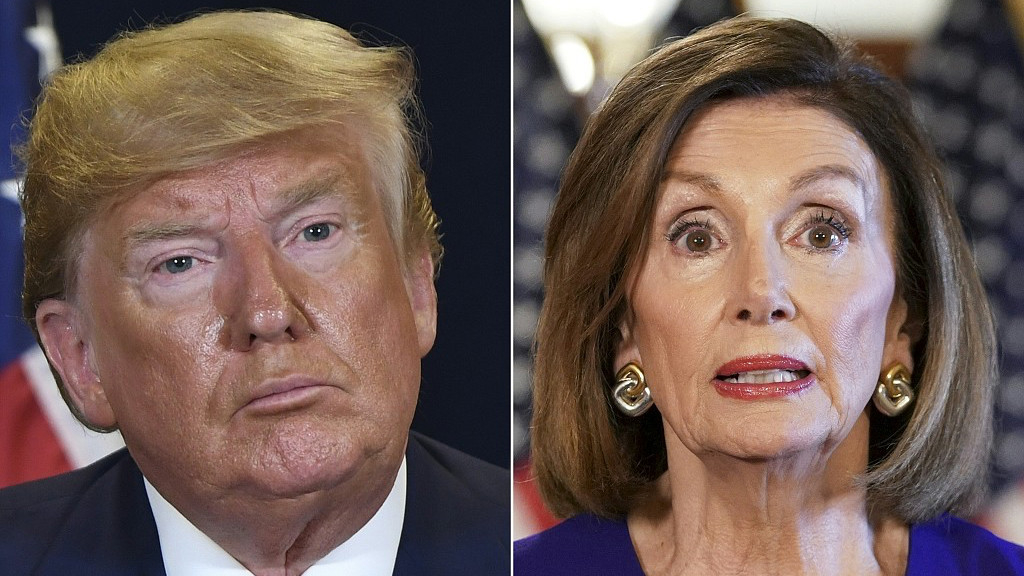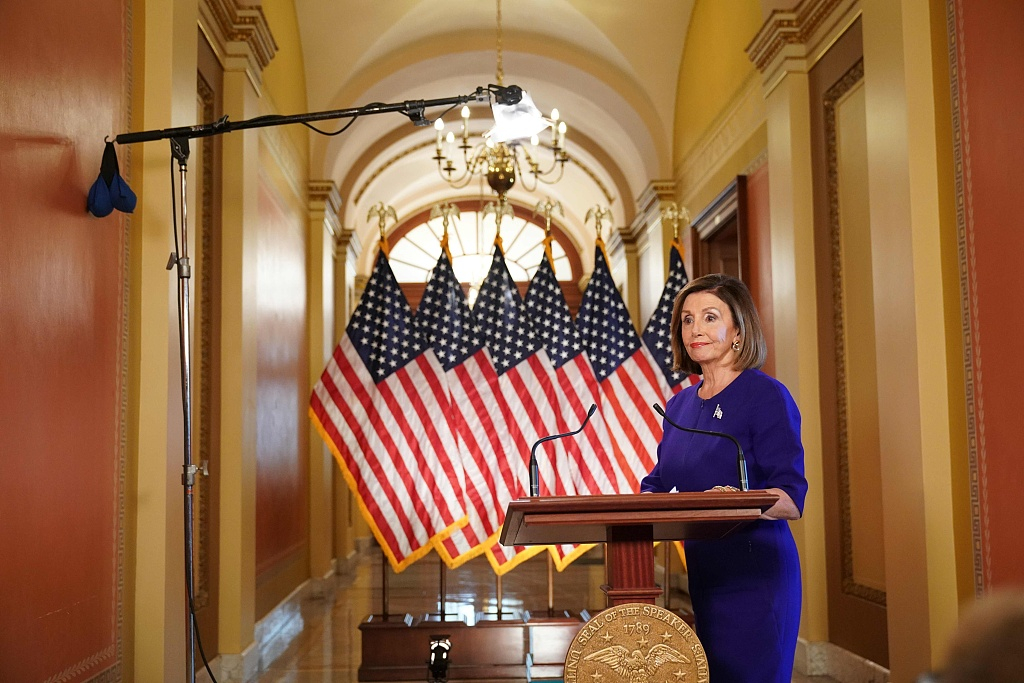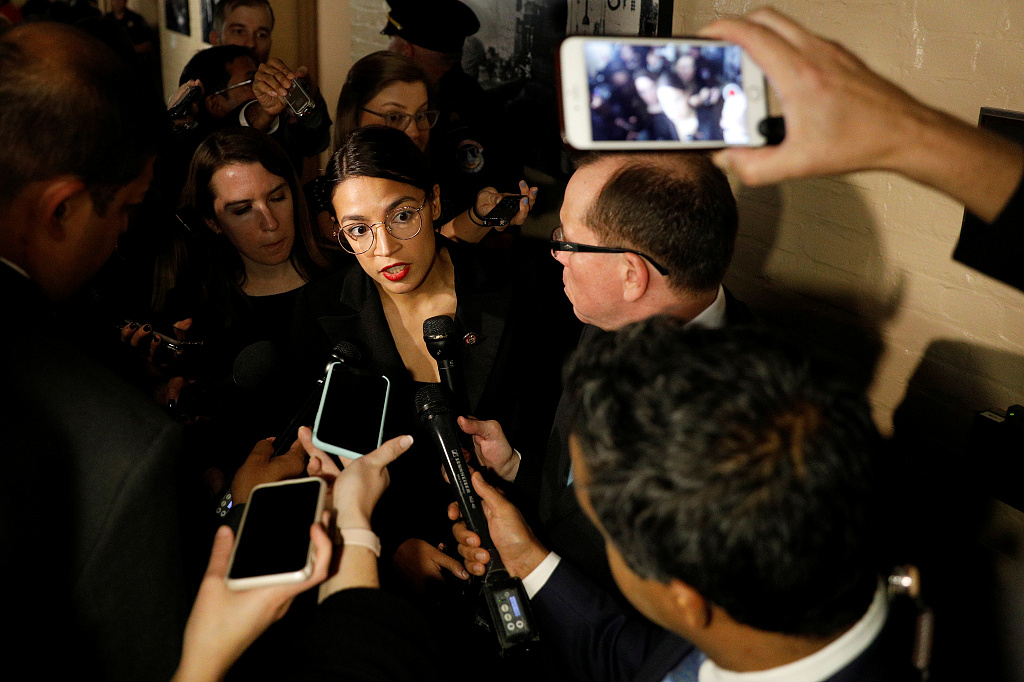
Editor's note: Tom Fowdy graduated from Oxford University's China Studies Program and majored in politics at Durham University and writes about international relations focusing on China and the Democratic People's Republic of Korea. The article reflects the author's opinions, and not necessarily the views of CGTN.
On September 20, the shocking news emerged that Speaker of the U.S. House of Representatives Nancy Pelosi will be pursuing an impeachment procedure against U.S. President Donald Trump. The move comes after intelligence rumors emerged that the president had asked Ukrainian leader Volodymyr Zelensky to provide "dirt" on the son of Democratic rival Joe Biden, widely seen as a frontrunner for the candidacy in the 2020 race under the mantra of withholding military aid to the country.
In doing so, Nancy Pelosi accuses the president of a "violation of the law" and a "breach of his constitutional responsibilities." She states the impeachment procedure is to make the president "accountable." The president responded to the allegations in a Twitter storm whereby he dismissed them as a "total witch hunt" and accused the Democrat Party of "Presidential harassment," a slogan long coined by him. He stated he will release the transcript of the phone call accordingly.
The implications of this move are huge, it was something Nancy Pelosi sat on the fence over for a long time, but now sees her time to strike. It is highly unlikely, owing to the influence of the Republican Senate, that Trump will be removed from office. However, the sentiments of this move will run long and deep in making American politics more polarized and divisive than ever before. While it will politically damage the president unquestionably, it is likely to have a radical effect on his closest supporters and core constituency, which will make the battles over every political issue a lot nastier and uncompromising.

U.S. Speaker of the House Nancy Pelosi, a California Democrat, announces a formal impeachment inquiry of U.S. President Donald Trump, September 24, 2019, in Washington, DC. /VCG Photo
U.S. Speaker of the House Nancy Pelosi, a California Democrat, announces a formal impeachment inquiry of U.S. President Donald Trump, September 24, 2019, in Washington, DC. /VCG Photo
What is impeachment? Impeachment is a procedure outlined in the United States Constitution that allows Congress to effectively investigate the presidential office and hold them to account for purported misconduct. This criterion is defined in the constitution as: "treason, bribery, or other high crimes and misdemeanors."
The House of Representatives, controlled presently by the Democrats, is endowed with the sole right of initiating proceedings. However, in turn with the separation of powers it is then the Senate who is given the responsibility to pursue the investigation and to subsequently determine its outcome, of which if found guilty, would see the President removed from office.
At no point in American history has a President been removed in such a manner. Two former Presidents were impeached, those being Andrew Johnson and Bill Clinton, and they are now joined by Donald Trump. Quite obviously on the basis of the allegation, the criterion of "Treason" is the one which the Democrats are pursuing.
If Trump was in an extreme scenario to be removed, Mike Pence would immediately assume the role as President, but if he resigns, then Nancy Pelosi. However as noted above, this isn’t likely to get very far as the Republican dominated senate would never agree to it.

U.S. Rep. Alexandria Ocasio-Cortez (D-NY) speaks to news reporters following an impeachment proceeding announcement, at the U.S. Capitol in Washington, U.S., September 24, 2019. /VCG Photo
U.S. Rep. Alexandria Ocasio-Cortez (D-NY) speaks to news reporters following an impeachment proceeding announcement, at the U.S. Capitol in Washington, U.S., September 24, 2019. /VCG Photo
In this case, we must examine this decision in the light of its longstanding political implications. With the president unlikely to be impeached, the procedure will nevertheless serve a detrimental effect in polarizing American politics even further.
Nancy Pelosi has for a long time been careful not to jump head first into an impeachment procedure against Trump. She has urged the House to try and take on the president pragmatically and productively, cooperating in some areas but resisting in others. However, something has now changed which has seen her giving into grassroots Democrat sentiment as a worthy political battle.
The impact will rally Democrats against the president, but will in turn decisively alienate and infuriate Republicans and the president's core supporters. Trump will undoubtedly fan up populist flames by portraying the move as a stitch up and even a conspiracy. Thus, on every single issue, the stakes will be raised and the political battles will become nastier and much more personal.
Nevertheless, it is true to say that Trump will be politically damaged by this. It is a hammer blow to this 2020 election campaign, the timing may not be coincidental but of course on this note of polarization, even if he loses next year this move ensures that the bitterness and the fallout will last long beyond his tenure. Make no mistake about it, this impeachment is unlikely to end the president's tenure, but it certainly is the commencement of a long, costly and unpleasant battle.
(If you want to contribute and have specific expertise, please contact us at opinions@cgtn.com.)